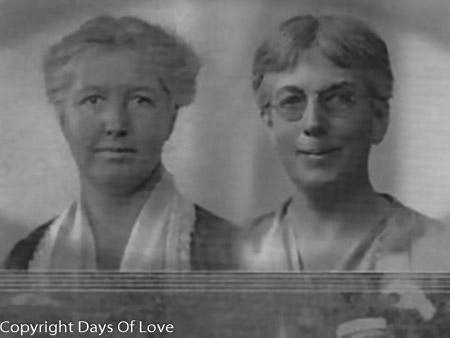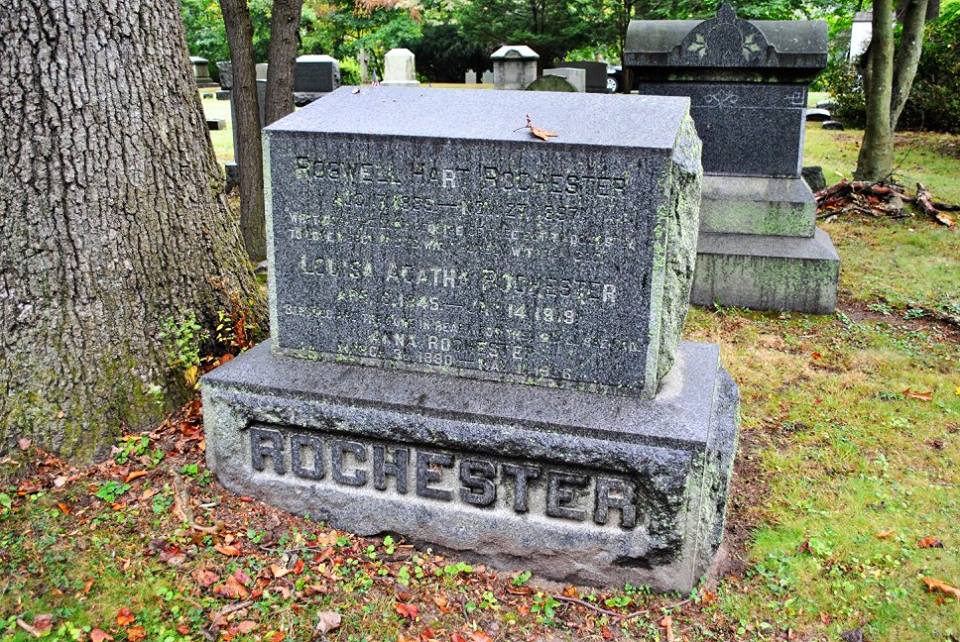

Partner Grace Hutchins
Queer Places:
Bryn Mawr College (Seven Sisters), 101 N Merion Ave, Bryn Mawr, PA 19010
Philbrook Farm Inn, 881 North Rd, Shelburne, NH 03581
2122 California St NW, Washington, DC 20008
171 West 12th Street, 10011, NYC, NY, USA
85 Bedford St, New York, NY 10014
Denison House, 93 Tyler St, Boston, MA 02111
Brookside Cemetery, 425 Engle St, Englewood, NJ 07631, Stati Uniti
 Anna Rochester (March 30, 1880 — May 11, 1966) was an American labor
reformer, journalist, political activist, and Communist.[1]
Although for several years an editor of the liberal monthly The World
Tomorrow, Rochester is best remembered as a co-founder of the Labor
Research Association, a bureau which collected and interpreted labor
statistics in close coordination with the Communist Party USA. The labour
reformer Anna Rochester, a ‘special agent’
for the New Jersey Consumers’ League and the researcher for an influential
report on poverty and infant mortality, mortality, met her partner, Grace Hutchins,
through Vida Dutton Scudder and the
Denison House Settlement in Boston. Rochester and Hutchins’ shared 45 years
embraced most conceivable revolutionary enterprises, including a women’s
commune, ‘the Community House’ shaped around an ethic of shared housekeeping,
and otherwise dubbed ‘the unsettlement house.’
Anna Rochester (March 30, 1880 — May 11, 1966) was an American labor
reformer, journalist, political activist, and Communist.[1]
Although for several years an editor of the liberal monthly The World
Tomorrow, Rochester is best remembered as a co-founder of the Labor
Research Association, a bureau which collected and interpreted labor
statistics in close coordination with the Communist Party USA. The labour
reformer Anna Rochester, a ‘special agent’
for the New Jersey Consumers’ League and the researcher for an influential
report on poverty and infant mortality, mortality, met her partner, Grace Hutchins,
through Vida Dutton Scudder and the
Denison House Settlement in Boston. Rochester and Hutchins’ shared 45 years
embraced most conceivable revolutionary enterprises, including a women’s
commune, ‘the Community House’ shaped around an ethic of shared housekeeping,
and otherwise dubbed ‘the unsettlement house.’
In the 21st Century Rochester became the subject of academic interest for the duality of her public political activity with successful maintenance of a long-term same-sex affectionate relationship with fellow communist Grace Hutchins, a relationship considered taboo according to the social mores of the day. Although the pair lived as partners for over 40 years, Rochester never self-identified as a lesbian and the question of whether the pair were sexually intimate remains unresolved.
Anna Rochester was born March 30, 1880 in New York City. She was the daughter of Roswell Hart Rochester, an executive who worked as Treasurer of the Western Union Telegraph Company, and his wife, the former Louise Agatha Bauman, who had been a public school teacher before her marriage.[2] Anna was the couple's only child.[2] Unlike many of the participants in the American radical movement of her era, the Rochester family had long roots in the United States, with her father's paternal grandfather, Nathaniel Rochester, the namesake and founder of the city of Rochester, New York.[3]
Anna spent her developmental years in privilege in the city of Englewood, New Jersey, a comfortable suburb of New York City.[2] The Rochester family lived in a large and well equipped home, employing attendants to help raise the child and servants to keep the household running.[3] Anna traveled extensively as a young girl, studied music in Germany, and received a first-class private school education at the Dwight School for Girls.[4] She exhibited intelligence and a penchant for scholarship at a comparatively young age, and briefly aspired to the advanced study of mathematics.[5]
2122 California St NW, Washington, DC 20008
171 West 12th Street
85 Bedford St

The Rochesters were a religious family and Anna was raised as a Protestant in the Episcopal Church, attending her first church service when she was just 5 and undergoing confirmation as a member of the church in 1894, at the age of 14.[6] Anna was strongly imbued with the moral code of the church, which stressed simplicity, modesty, and service to others.[6] Her religious fervor would continue to develop in her late teen years.[7]
Rochester was admitted to Bryn Mawr College, one of America's premier women's liberal arts universities, located ten miles west of Philadelphia.[7] Her coursework proceeded as well as could be expected, but she found her collegiate career cut short by family matters, with her father dying of a heart attack in the middle of her freshman year and her mother falling ill of "nervous collapse" near the end of her sophomore session.[8] This would mark the end of Rochester's tenure at Bryn Mawr. Anna became her mother's caretaker, visiting the spas of Europe and vacationing at summer resorts in search of a "cure."[9]
The summer of 1904 mother and daughter spent at a new resort, Philbrook Farm of Shelburne, New Hampshire.[9] It was there that Rochester met Vida Dutton Scudder, a political activist motivated by the social gospel, and her lesbian partner, the writer Florence Converse.[9] The connection proved both politically and socially illuminating. A male suitor was turned away in 1907, and a return to Philbrook Farm in 1908 invigorated Rochester's interest in sociology and the ongoing progressive campaign to ameliorate the ills of modern industrial society.[9] Her discovery that same summer of Walter Rauschenbusch's seminal book, Christianity and the Social Crisis, completed Rochester's conversion from socialite to social activist.[9]
From 1912 until 1915, Rochester worked as a researcher and for the publicity department of the National Child Labor Committee, a private non-profit organization established in 1904 to help end child labor.[10] Rochester continued in this same area in 1915 when she moved to the United States Children's Bureau, a government agency created in 1912, where she again worked on research and publications.[10] She would remain with the US Children's Bureau through 1921.[10]
In 1922 Rochester assumed the editorship of The World Tomorrow, a Christian socialist monthly magazine which had been founded in 1918 by the pacifism Fellowship of Reconciliation and which was formerly edited by future Socialist Party leader Norman Thomas.[10]
Anna Rochester died of pneumonia on May 11, 1966 in New York City.[11] She was 86 years old at the time of her death. She is buried at Brookside Cemetery, Englewood, with her parents.
Anna Rochester's papers reside in the Special Collections department of Knight Library at the University of Oregon in Eugene.
Anna Rochester (1880-1966), Ellen Day Hale (1855-1940), Carl van Vechten (1880-1964) and Ethel Sands (1873-1962), all descend from the same Pilgrims, Alice Carpenter and her husband William Bradford (arrived with the Mayflower), Alice's sister, Priscilla Carpenter and her husband George Morton, and George Soule (arrived with the Mayflower)

Tony Scupham-Bilton -
Mayflower 400 Queer Bloodlines
My published books: